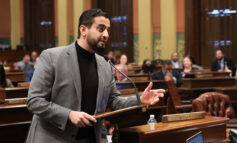
DEARBORN — If the Internet’s virtual reality is a true reflection of our society, then America has major issues with xenophobia, particularly anti-Muslim bigotry. Social media, which brought the power of storytelling to every American with access to the Internet, are filled with hate-mongering against Muslims.
Controversial stories involving Muslims are often flooded with negative comments about the Islamic faith and its followers. From calls to “go home” to intimidating remarks that include direct threats.
A tweet in which an anti-Muslim user says he wants to go “target shooting” in Dearborn made rounds on social media last week.
“You, your religion, your national origins are EVIL. You don’t belong in this country,” reads a tweet that was directed at The Arab American News.
Such statements come on the heels of the armed anti-Muslim protest in front of a mosque in Phoenix, raising concerns about the perils of abusing the free speech granted by the First Amendment.
The freedom of speech granted by the Constitution is supposed to be a marketplace of ideas where hate speech is destined to fail. However, the anti-Muslim sentiments in the country have allowed bigoted speech against Muslims to be socially tolerated.
Speaking to The Arab American News, Muslim and civil rights activists urged Muslims to respond to hate speech by promoting a positive image of their communities.
Xenophobia on the rise
Dawud Walid, the executive director of the Council on American Islamic Relations in Michigan (CAIR-MI), said bigoted online comments do not represent the majority of society by signify that racism and intolerance are on the rise.
He added that CAIR takes online threats seriously.
“If people are proposing to commit an act of violence, it should be reported to law enforcement,” he said.
Walid suggested forwarding comments of concern to CAIR or other civil rights organizations, which can report them to the appropriate agencies.
He cited the armed anti-Muslim demonstration in front of a mosque in Phoenix to highlight bigots’ contradictory perceptions of free speech.
“It’s a hypocrisy within the application of the First and the Second amendments,” he said. “Those people came to the mosque to ridicule Islam and we had First Amendment rights to say we are offended by their speech. Then, the focus came back on us and why we don’t respect free speech.”
He added that if Muslims were to exercise their Second Amendment rights by carrying guns and assault weapons, like the “biker gangs” at the Phoenix demonstration, they would be painted as violent extremists and put under police scrutiny.
Walid also said it would be productive to interact with social media users who have misunderstandings about Islam, “but if a person is openly displaying hate messages like ‘F— Islam’, they shouldn’t be engaged.
“There is no swaying someone who has xenophobic and bigoted views in a few-character tweet,” he said.
Yemeni American feminist activist Rasha Almulaiki, who has been the target of hateful comments on the Internet, said she feels disappointment in fellow humans and anger when she witnesses bigotry.
“Most of the time it is frightening to think of oneself as a target of seemingly bottomless rage,” she said. “I find myself thinking of W.E.B Du Bois’ increasingly relevant question, ‘How does it feel to be a problem?’, to which I am always determined to answer, ‘It shouldn’t feel like anything, because I am not.'”
Almulaiki, who is a member of the Z Collective, a Muslim/Arab feminist group, described hate speech as “violence with words” that can lead to other forms of violence.
“In the U.S., it is often excusable or justifiable when the hate speech is conducted by a dominant faction, usually White individuals,” she said.
She added that the contrast between tolerating Islamophobia and the “slanted scrutiny” of anti-police brutality protesters shows that classifying activism as “free speech” or “hate speech” depends on the identity of the speaker.
Almulaiki said she chooses her battles wisely when deciding whether to respond to hateful online remarks.
She explained that sometimes she feels a duty to intervene to prevent negative voices from dominating.
“If I conclude that the person making that hateful remark is irrational and not looking to actually engage in meaningful, productive discussion, I take a step back and utilize my time and energy elsewhere where it will be more effective,” Almulaiki added.
Steven Urenda, the cofounder of the interfaith group The Bridge, a Jewish, Christian and Muslim Alliance, said anti-Muslim social media users represent a significant part of society.
“I hate to say it, but many Americans don’t know who Muslims are, even at a basic level,” he said.
Urenda added that growing fear and resentment of Muslims among conservatives is turning into a pop culture of hate.
“We are a trend-driven nation and ultimately we are a nation of many followers,” he said. “People promote the pervasive anti-Muslim culture on the Internet without second thoughts. It is a dangerous trend, linked to fear.”
He added that there is a general xenophobic attitude in the country that perceives people who are different as a threat; so anti-Muslim sentiments are becoming more prominent with the growth of the Muslim American community.
“Americans have gotten out of the habit of knowing their neighbors and recognizing others as human beings,” Urenda said.
He also said social media users who make anti-Muslim remarks should be challenged in a sound way that would make them reconsider their views without making them defensive.
Hate speech and the law
Nabih Ayad, the chairman of the Arab-American Civil Rights League (ACRL), said there is no clear line where intimidating comments rise the level of a legal offense, because the First Amendment is a powerful protector of free speech.
He added that wishing harms to Muslims would not necessarily be interpreted as a threat, legally.
“If it is not a clear, imminent threat, the court would interpret it as a statement without any kind of action put forward,” Ayad said.
He explained that a menacing statement could constitute grounds for legal prosecution if it is current and specific in targeting individuals, events or organizations. He added that material planning could give weight to a social media post as a criminal “doable” plot.
“If somebody says he would like to attack Dearborn and he is buying a whole bunch of bullets and has a map of the city, then the post would be considered a real threat,” Ayad said.
He added that the rise of hate speech is a concern, especially because there are “crazy people out there” who might try to harm Arab and Muslim communities, believing that they are doing service to the country.
Ayad, who served on Michigan’s Civil Rights Commission under Gov. Granholm, hailed the protections of First Amendment because free speech allows Arabs and Muslims to combat bigotry with their own speech.
“There should be a more positive, loving message about Arabs and Muslims to neutralize the hatred,” he said. “In general, we should talk about the great things Arabs and Muslims have contributed to society, how they serve in the U.S. military and put their lives on the line. We are professionals, engineers, doctors and students and a part of the fabric of this nation.”
Rana Elmir, the deputy director of the American Civil Liberties Union (ACLU) of Michigan, said the organization is “deeply concerned about the wave of anti-Muslim sentiment around the country.”
However, she reiterated the ACLU’s support for free speech.
“As a matter of policy and principle, we believe the best way to combat hate speech is with more speech, not censorship,” she said.
Elmir said the First Amendment protects opinions from the government, but does not shield them from criticism, counter protests and boycotts.
“For instance, Rush Limbaugh has for years endured a boycott campaign targeting the sponsors of his radio show,” she said. “The reaction to Rush Limbaugh’s bigotry in the form of a boycott is protected speech and a good illustration of combating hate speech with more speech.”
Elmir said words can cause pain, but the government should not be trusted with regulating speech.
“History has taught us that government is more apt to use this power as a sword to prosecute minorities than a shield to protect them,” she said.
However, Elmir explained that freedom of speech does not protect individuals who use words to intimidate, harass or threaten others.
“True threats, whether in the form of a phone call and tweet, for example, are not constitutionally protected,” she said.
Elmir added that social media companies are not held to the same standards as the government and they have guidelines that disallow inciting speech.
#NotMyAmerica
Americans who hold unfavorable views of Islam have flooded social media with posts expressing their views. Websites like Facebook and Twitter have also been used by Muslims and non-Muslims to combat bigotry.
While more than 200 demonstrators showed up with guns and “F— Islam” shirts at a mosque in Phoenix to protest Islam on May 29, under the protection of the First Amendment, an online campaign confronted the armed protestor with their own means— free speech.
The Campaign to Take on Hate encouraged social media users to include the hashtag #NotMyAmerica in their responses to the protesters. The hashtag garnered thousands of tweets condemning bigotry and questioning the patriotism of the demonstrators.
Other posts highlighted the ulterior political and financial motives of targeting American Muslims and sympathized with the families and children at the mosque, who had to be exposed to the intimidation, hatred and profanity.
“Pretty sure Jesus wouldn’t bring ammo to a mosque. Better throw away your #WWJD [what would Jesus do] bracelets. #NotMyAmerica,” tweeted journalist Susie Meister.
The parody account of an imaginary Republican congressman from California pointed to the hypocrisy of accepting the rally as free speech.
“Imagine if these were armed Muslim protesters outside a white evangelical church or the Academy of Country Music Awards #NotMyAmerica,” wrote fictional Rep. Jack Kimble.
But like any hashtag, #NotMyAmerica was also used against its intended purpose. Anti-Muslim Twitter accounts included it in their posts to support the rally.






Leave a Reply